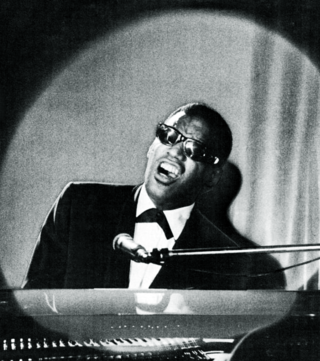
Soul music is a popular music genre that originated in the African American community throughout the United States in the late 1950s and early 1960s. It has its roots in African-American gospel music and rhythm and blues. Soul music became popular for dancing and listening, where U.S. record labels such as Motown, Atlantic and Stax were influential during the Civil Rights Movement. Soul also became popular around the world, directly influencing rock music and the music of Africa. It also had a resurgence with artists like Erykah Badu under the genre neo-soul.
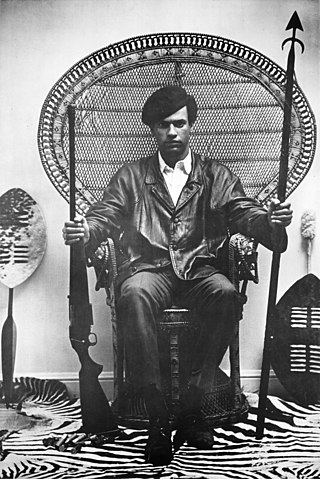
Huey Percy Newton was an African-American revolutionary and political activist. Newton was most notable for being a co-founder of the Black Panther Party where he operated the organization as the de-facto leader. Newton crafted the Party's ten-point manifesto with Bobby Seale in 1966.

USS Forrestal (CVA-59), was a supercarrier named after the first United States Secretary of Defense James Forrestal. Commissioned in 1955, she was the United States' first completed supercarrier, and was the lead ship of her class. The other carriers of her class were USS Saratoga, USS Ranger and USS Independence. She surpassed the World War II Japanese carrier Shinano as the largest carrier yet built, and was the first designed to support jet aircraft.

James Vincent Forrestal was the last Cabinet-level United States Secretary of the Navy and the first United States Secretary of Defense.
Sic semper tyrannis is a Latin phrase meaning "thus always to tyrants". In contemporary parlance, it means tyrannical leaders will inevitably be overthrown.

Andrew Russell Pearson was one of the best-known American columnists of his day, noted for his syndicated newspaper column "Washington Merry-Go-Round". He also had a program on NBC Radio titled Drew Pearson Comments. He was known for his fearless approach even towards high level politicians, such as Senators, Cabinet members, generals and Presidents of the USA.

Containment was a geopolitical strategic foreign policy pursued by the United States during the Cold War to prevent the spread of communism after the end of World War II. The name was loosely related to the term cordon sanitaire, which was containment of the Soviet Union in the interwar period.

The "X Article" is an article, formally titled "The Sources of Soviet Conduct", written by George F. Kennan and published under the pseudonym "X" in the July 1947 issue of Foreign Affairs magazine. The article widely introduced the term "containment" and advocated for its strategic use against the Soviet Union. The piece expanded on ideas expressed by Kennan in a confidential February 1946 telegram, formally identified by Kennan's State Department number, "511", but informally dubbed the "long telegram" for its size.
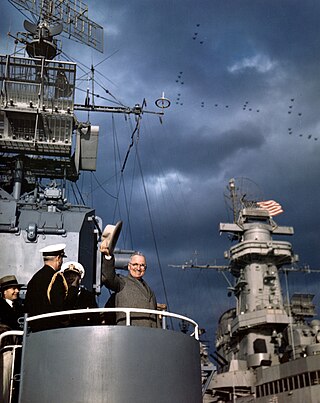
The "Revolt of the Admirals" was a policy and funding dispute within the United States government during the Cold War in 1949, involving a number of retired and active-duty United States Navy admirals. These included serving officers Admiral Louis E. Denfeld, Chief of Naval Operations, and Vice Admiral Gerald F. Bogan, as well as Fleet Admirals Chester Nimitz and William Halsey, senior officers during World War II.

"Vive le Québec libre !" was a phrase in a speech delivered by French President Charles de Gaulle in Montreal, Quebec on July 24, 1967, during an official visit to Canada for the Expo 67 world's fair. While giving an address to a large crowd from a balcony at Montreal City Hall, he uttered "Vive Montréal ! Vive le Québec !" and then added, followed by loud applause, "Vive le Québec libre !" with particular emphasis on the word libre. The phrase, a slogan used by Quebecers who favoured Quebec sovereignty, was seen as giving his support to the movement. The speech caused a diplomatic incident with the Government of Canada and was condemned by Canadian Prime Minister Lester B. Pearson, saying that "Canadians do not need to be liberated". In France, though many were sympathetic to the cause of Quebec nationalism, De Gaulle's speech was criticized as a breach of protocol.
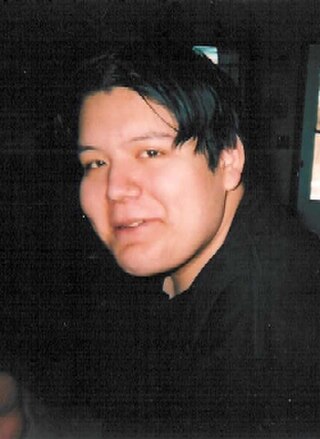
Jeffrey James Weise was an American student at Red Lake Senior High School in Red Lake, Minnesota, who committed the Red Lake shootings on March 21, 2005.
"Terma" is the ninth episode of the fourth season of the American science fiction television series The X-Files. It premiered on the Fox network on December 1, 1996. It was directed by Rob Bowman, and written by Frank Spotnitz and series creator Chris Carter. "Terma" featured guest appearances by John Neville, Nicholas Lea and Fritz Weaver. The episode helped explore the series' overarching mythology. "Terma" earned a Nielsen household rating of 10.3, being watched by 17.34 million viewers during its original airing.
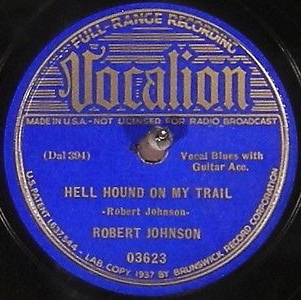
"Hellhound on My Trail" is a blues song recorded by Mississippi Delta bluesman Robert Johnson in 1937. It was inspired by earlier blues songs and blues historian Ted Gioia describes it as one of Johnson's "best known and most admired performances—many would say it is his greatest".

Michael Vincent Forrestal was one of the leading aides to McGeorge Bundy, the National Security Advisor of President John F. Kennedy. He was seen as a pivotal figure in the changing of U.S. foreign policy, including recommending support for the coup d'état that deposed the first president of South Vietnam, Ngô Đình Diệm.
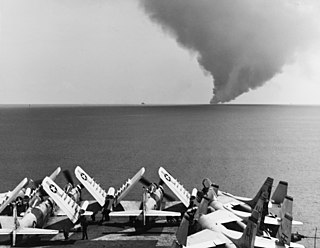
On 29 July 1967, a fire broke out on board the aircraft carrier USS Forrestal after an electrical anomaly caused a Zuni rocket on an F-4B Phantom to fire, striking an external fuel tank of an A-4 Skyhawk. The flammable jet fuel spilled across the flight deck, ignited, and triggered a chain reaction of explosions that killed 134 sailors and injured 161. At the time, Forrestal was engaged in combat operations in the Gulf of Tonkin, during the Vietnam War. The ship survived, but with damage exceeding US$72 million, not including the damage to aircraft. Future United States Senator John McCain and future four-star admiral and U.S. Pacific Fleet Commander Ronald J. Zlatoper were among the survivors. Another on-board officer, Lieutenant Tom Treanore, later returned to the ship as its commander and retired an admiral.

The Charge of the Light Brigade was a tragic military action involving a Pyrrhic victory by the British light cavalry against Russian forces during the Battle of Balaclava in the Crimean War. On 25 October 1854 the Light Brigade, led by Lord Cardigan, was ordered by Lord Raglan to mount a frontal assault against a Russian artillery battery which was well prepared with excellent fields of defensive fire. The charge was the result of a miscommunication in the chain of command, as Raglan had intended to send the Light Brigade on a different mission for which the light cavalry were well suited, namely to prevent the Russians from removing captured guns from overrun Turkish positions. The Light Brigade made its charge under withering direct fire and reached its target, scattered some of the gunners, but were forced to retreat immediately, and the assault ended with very high British casualties and no decisive gains.

Admiral John Edward Gingrich was an officer in the United States Navy who served as the first chief of security for the United States Atomic Energy Commission from 1947 to 1949, and as Chief of Naval Material from 1953 to 1954. He retired from the Navy as a four-star admiral.

The phrase "suicide, it's a suicide" was first used by rapper KRS-One in the song "Moshitup" in 1987. It has since entered into hip hop music as a meme, and has been used by artists such as Ice-T, Gravediggaz, Redman, Fabolous, Ras Kass, Jay-Z, Jedi Mind Tricks, Snoop Dogg, Goldie Lookin' Chain, Krayzie Bone, Wyclef Jean, Pusha T and Lil Wayne. It serves as a good example of the intertextual nature of the genre, where quoting older works serves as a form of homage to other artists.

Rear Admiral Morton Claire Mumma, Jr. was a senior officer in the United States Navy. He was awarded the Navy Cross for actions on 13 December 1941 while commanding USS Sailfish (SS-192) during World War II. He later served as naval aide to Secretary James Forrestal in 1944–45, and retired in 1946. Mumma was president of the National Rifle Association from 1955 to 1957, and at his death was on the association's executive council.

Korean Air Lines Flight 007 alternative theories concerns the various theories put forward regarding the shooting down of Korean Air Lines Flight 007. The aircraft was en route from New York City via Anchorage to Seoul on September 1, 1983, when it strayed into prohibited Soviet airspace and was shot down by Soviet fighter jets.


















